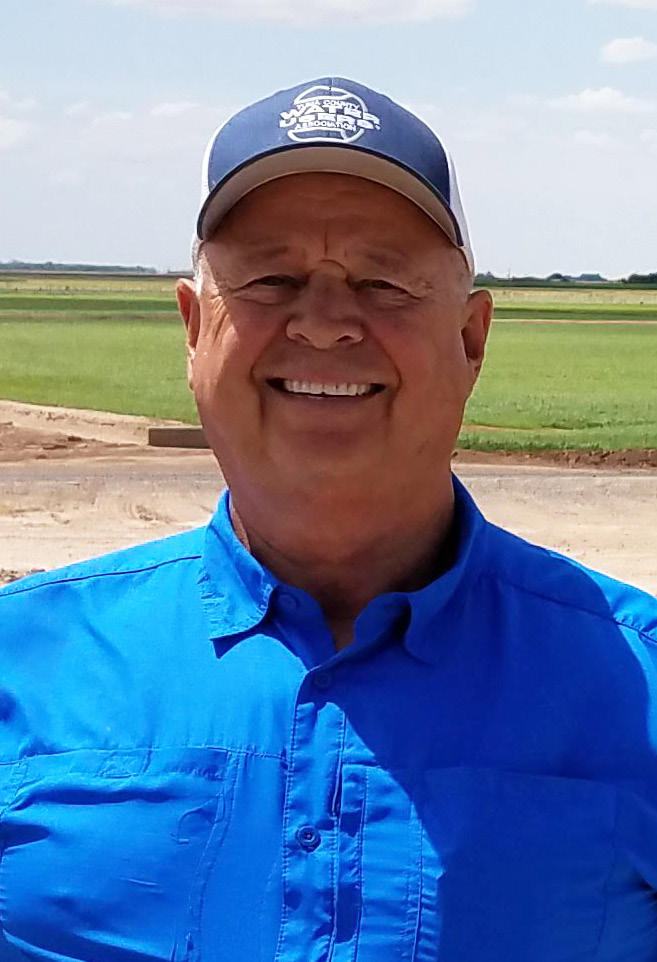Years working in irrigation: 33
Years as manager: 33
Number of employees: 69
Size of service area in acres: 50,000
Amount of water diverted for irrigation per year in acre-feet: 365,000
Main crops irrigated: Cauliflower, broccoli, lettuce, bok choy, kale, celery, desert durum wheat, dates, melons, cotton
Predominant irrigation methods: Sprinkler, furrow, flat surface, drip
 Irrigation Leader: What is the top issue facing your irrigation district today?
Irrigation Leader: What is the top issue facing your irrigation district today?
Tom Davis: We’re the last, but most senior, diverters on the Colorado River system in the United States, and we’re protective of our water rights, which are coveted by upstream junior water users. Maricopa County, in central Arizona, is the fastest-growing county in the United States, so keeping up with its demand for water is challenging.
Irrigation Leader: What future issues are you preparing for?
Tom Davis: We were one of the first districts to be commissioned by Congress and built by the Bureau of Reclamation after the Reclamation Act. We have facilities that are over 100 years old, and parts of our delivery system need to be totally replaced. We’re a relatively small district acrewise, so it’s difficult to generate enough capital just through per-acre assessments to finance the necessary capital improvements.
The increasing food safety requirements of the U.S. Food and Drug Administration are another growing expense and concern. Not only are we concerned with water quality, particularly with reference to E. coli and salmonella, we’re very careful with all our cultural practices around our delivery system, our power plants, and so forth.
Irrigation Leader: What are your top issues regarding personnel?
Tom Davis: Employers everywhere are looking for employees who are motivated, loyal, trainable, and capable. Like all irrigation projects, we can’t pay wages that are competitive with what employees can make in other fields of work. We also have an aging workforce.
Irrigation Leader: What training do you currently provide to your employees?
Tom Davis: We have different training for heavy equipment operators, truck drivers, welders, fabricators, and concrete construction crews. All employees have safety training once a year or more frequently if necessary. Our information technology and computer-assisted design folks keep current in their fields.
Irrigation Leader: How much do you spend on training for your employees each year?
Tom Davis: In addition to their annual salary, an employee probably costs another 60 percent in insurance and retirement benefits, uniforms, vehicles, worker’s comp, and on-the-job training. I estimate that 8 percent of employee cost is in training.
Irrigation Leader: What is the most important thing you have learned as manager?
Tom Davis: You have to communicate with and have the trust of both the board of directors and your employees. You must have the best interests of your employees in mind at the same time as you operate an efficient organization in accordance with the board’s direction. A manager must consider the personalities of the staff and make sure employees are treated properly while ensuring that they give a day’s work for a day’s pay.
Irrigation Leader: What are the top skills needed to be a successful manager?
Tom Davis: I think most of it is personality and lots of energy. You have to be patient and decisive; at the same time, you must have a sense of urgency about getting things done. Oftentimes, board members only understand a narrow part of an issue. A manager has to understand and communicate the big picture. Being a capable manager requires integrity, communication, education, skills, understanding, and caring.
Tom Davis is general manager of the Yuma County Water Users’ Association. He can be contacted at tdavis@ycwua.org or (928) 581-1882.
